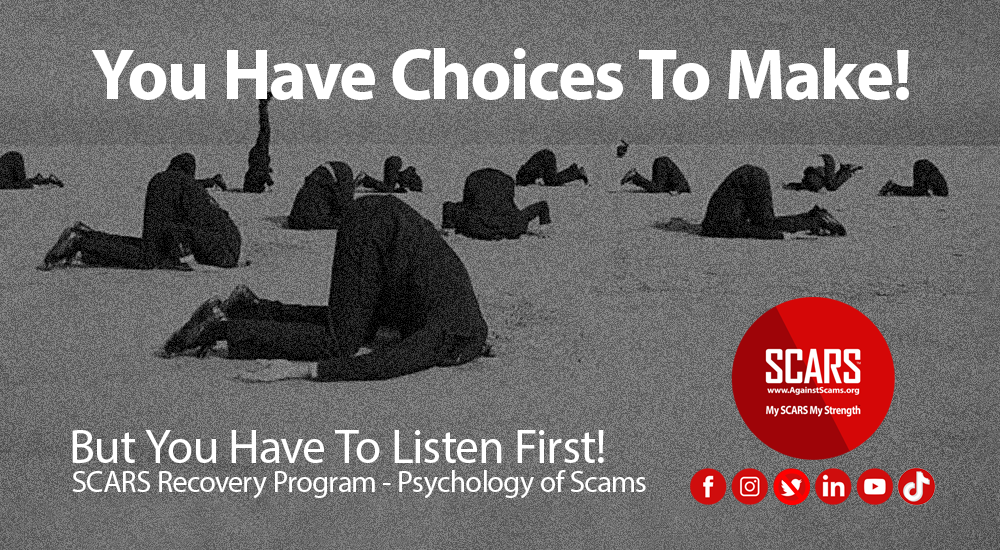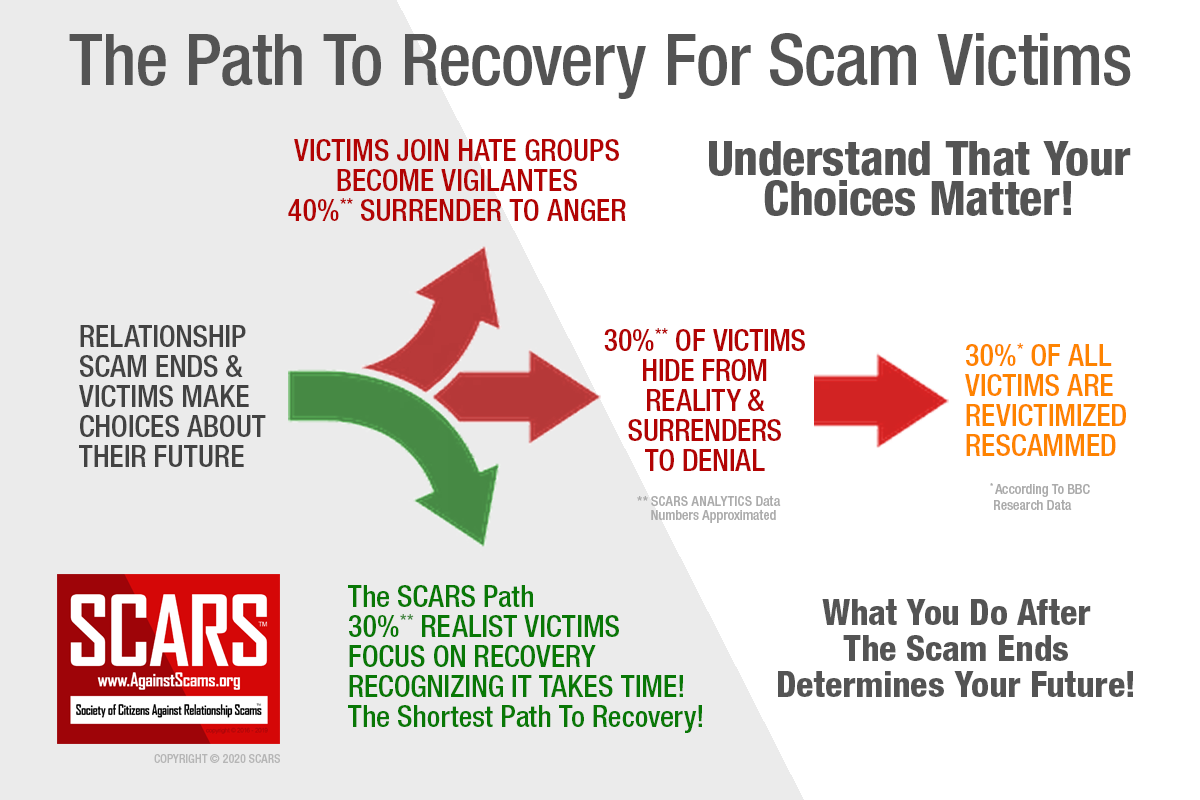You Have A Choice To Make!
Failure Is A Choice
However, YOU Can Recover If You Want! We Will Help You!
ARE YOU CHOOSING TO FAIL?
When You Are Scammed, Why Wouldn’t You Want To Protect Yourself?
Strangely, many scam victims ignore their own safety.
Yes, only about half of victims bother to follow the recommended actions to secure their own safety. Even members of this group have not fully secured their profiles.
Why is that?
Continued biases, apathy, procrastination, and denial.
Think about that for a minute! There are still people in this group that allow scammers to send them friend requests!
Why would you want that?
To be serious about your recovery and your safety – not to mention the safety of your friends and family – you have to be serious about your online safety and social media profile settings. If you are not, then by definition you are not serious about your recovery or safety, or the safety of people you are connected with.
That is a pretty judgmental statement, but there are consequences to actions and decisions.
The scam can be forgiven because you were not at fault, but once you learn and then still do not act, then that is just denial & negligence. Hard truth!
So here is what is expected of every recovering scam victim:
- Block all scammers and stop all communications – that means don’t even read it – if you can read it, it means you DID NOT BLOCK them. In your email, it means marking them as junk or spam.
- Clean out your Facebook or social media friend’s/contacts list – no one that you do not physically know. If you do not really know them they must be gone.
- Eliminate the FOLLOWER option on Facebook – not one should ever have followers unless you are a celebrity. No one here is a celebrity, sorry!
- Disable friend requests except from “friends of friends” on Facebook. No strangers.
- Do the same for messages in Facebook and other messengers.
- Change the visibility settings for everything in your Facebook or other social media profile, except your main profile image. Nothing should be visible to strangers.
- Always use a brief form of your name – your real name, but not your legal name. You need to be able to defend your profile if Facebook asks for your ID. Plus anything but a real name is prohibited by FB.
- Be careful what you post on public pages. Too much information makes you a target.
- Delete accounts that you only have because of the scammer, such as Google HANGOUTS – do not simply stop using them, delete them.
- Secure your email account with TWO FACTOR AUTHENTICATION. Do the same for all of your critical accounts, such as banking. You main email is the key to all of your accounts, if you lose control of that you lose control of everything.
- Change all of your critical passwords since the scam to STRING PASSWORDS. Here is a simple model: AnimalType#Number@websitename – such as “Womabt#32@Facebook: – that is actually a very strong password
- If your scammer knew of your critical IDs, such as bank account numbers – change them. One phone call is enough to change account and card numbers. About 37% of scam victims have their identities stolen.
- Tell your friends and family that you “removed someone and they should be on alert for strangers contacting them” – you should tell them you were scammed, but at least alert them to the “stranger”.
- Stop listening to amateur anti-scam groups that spread false news, urban legends, and don’t know what they are doing, but just focus on hating scammers! Either they are an incorporated nonprofit, or they are amateurs!
- Learn how this happened to you and other ways to be safe in the future! This website is the right place for that!
- Stop focusing on your scammer, and instead focus on yourself, your trauma, and your recovery!
How can anyone argue with this?
Yet MOST victims do not do all or even most of these things.
This is denial.
You control your recovery success or not.
This is being very blunt, but our SCARS Steps Recovery Process requires that YOU make up your own mind and make your own commitment.
We cannot fix victims, just show them the path.
This is true of EVERY successful substance recovery program for the last 120 years! Yes, a romance scam is a substance recovery process, Both because of the addictive nature of your own hormones, and because of the psychological dependencies that were created by the manipulation.
This means that much of what a victim (YOU) has to go through is the same as for a drug or alcohol addict. With the same psychological acceptance, acknowledgments, and commitments, to make it through the process. And just like any addict, if you are not willing to make the commitment, you will not recover.
Sadly, it is that simple.
You do not need to follow the SCARS Steps Recovery Program (in its various forms), because you can go through other recovery programs, or counseling, or therapy, and get to the same place. Any of them can be just as effective. But in all cases, it demands acceptance, acknowledgment, and commitment.
Anything less is denial or worse.
We are here to help in every way possible, but the work HAS TO BE DONE by you.
If you fail, then you fail. It is your life you are continuing to screw up.
If you succeed, it is your life you are recovering, and YOU deserve all the credit.
As we say to all, we wish you well.
We will be here if you are serious or even if you are not, but we can only help those that make the effort. If you stop short, it is only yourself you are hurting – and maybe those around you. But that is your choice, not ours.
Denial, apathy, and procrastination ARE CHOICES.
Choose well, please.
As always, please share how you feel about this.
PLEASE SHARE OUR ARTICLES WITH YOUR FRIENDS & FAMILY
HELP OTHERS STAY SAFE ONLINE – YOUR KNOWLEDGE CAN MAKE THE DIFFERENCE!
THE NEXT VICTIM MIGHT BE YOUR OWN FAMILY MEMBER OR BEST FRIEND!
By the SCARS™ Editorial Team
Society of Citizens Against Relationship Scams Inc.
A Worldwide Crime Victims Assistance & Crime Prevention Nonprofit Organization Headquartered In Miami Florida USA & Monterrey NL Mexico, with Partners In More Than 60 Countries
To Learn More, Volunteer, or Donate Visit: www.AgainstScams.org
Contact Us: Contact@AgainstScams.org
TAGS: SCARS, Information About Scams, Anti-Scam, Scams, Scammers, Fraudsters, Cybercrime, Crybercriminals, Romance Scams, Scam Victims, Online Fraud, Online Crime Is Real Crime, Scam Avoidance, SCARS Recovery Program, SCARS Steps, Scam Victim Recovery, Victims in Denial,







Please Leave A Comment - Tell Us What You Think About This!